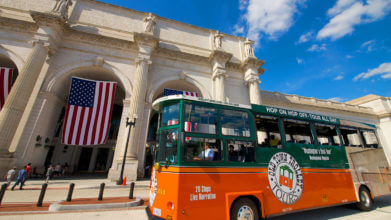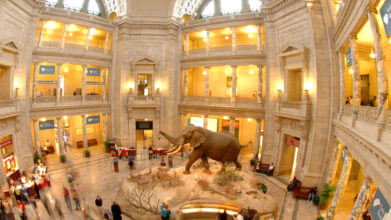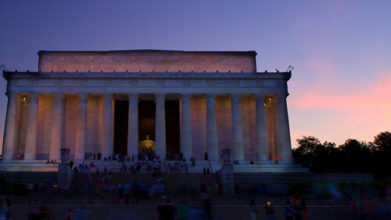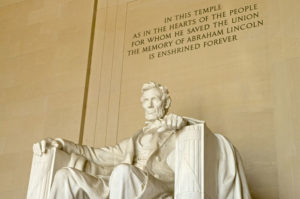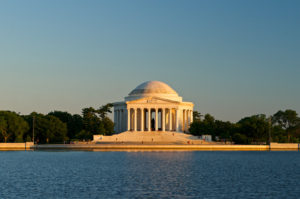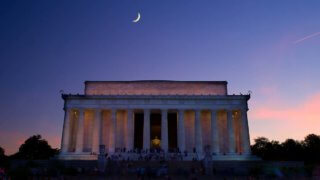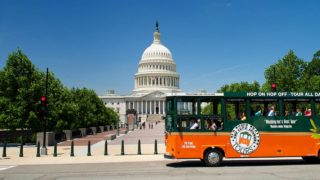Washington Monument
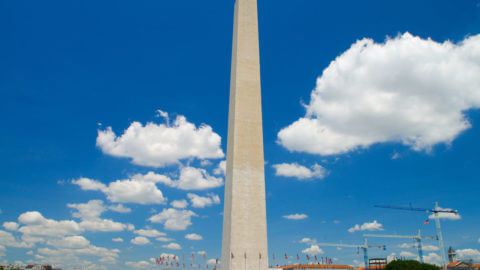
Washington Monument
One of the most celebrated and spectacular sights on the National Mall, the Washington Monument, stands as a grand tribute to our nation’s first President, George Washington. The 555 foot obelisk is also one of the oldest and most recognizable memorials in the City. While construction began in 1848, the monument was not completed until 1884 because of financial difficulties during the Civil War.
Get ready to #VacationMore with Old Town Trolley in Washington DC!
Exploring the Washington Monument with Old Town Trolley Tours
The most efficient and insightful way to visit the Washington Monument and the surrounding National Mall is with Old Town Trolley Tours. This fully narrated sightseeing experience lets guests maximize their time while exploring the nation’s most iconic landmarks. Old Town Trolley Tours provides convenient hop-on, hop-off access, allowing visitors to easily reach the Monument grounds and nearby memorials while learning the fascinating history of Washington, D.C.
- Maximum Flexibility: Enjoy the freedom of our Hop-On, Hop-Off route with stops throughout the National Mall, including near the Washington Monument.
- Insightful Tours: Hear captivating stories and historical insights from professional conductors who bring the nation’s capital to life.
- Time Efficiency: Effortlessly explore D.C.’s most significant landmarks in one day without worrying about parking or navigation.
- Convenient & Stress-Free Travel: Skip the hassle of parking or navigating busy streets and enjoy seamless transportation between D.C.’s most popular landmarks.
The Washington Monument and Nearby Attractions
The Washington Monument: Admire the soaring 555-foot obelisk honoring George Washington, the nation’s first president, and enjoy panoramic views from its observation deck.
- World War II Memorial: Visit the stunning tribute to the 16 million Americans who served during World War II, located at the east end of the Reflecting Pool.
- Lincoln Memorial: Walk the steps to the larger-than-life statue of Abraham Lincoln and reflect on his legacy at one of D.C.’s most visited memorials.
- Vietnam Veterans Memorial: Pay respects at the solemn black granite wall engraved with the names of over 58,000 service members who gave their lives in Vietnam.
- Korean War Veterans Memorial: View the hauntingly realistic statues of soldiers in formation, symbolizing courage and sacrifice during the Korean War.
At the bottom of the monument, fifty American flags fly in honor of George Washington, symbolizing the current fifty states and the nation he founded.
Admission to the Monument
Today, visitors to Washington DC can tour the monument and visit it day or night, including climbing to the top of the obelisk. Although it is free and open to the public, guests need to get tickets in order to tour the monument. Tickets can be reserved in advance of you can go to the Washington Monument Lodge on 15th Street adjacent to the Monument to pick them up. You’ll be given a specific time for your tour.
What You’ll See
Tours of the Washington Monument begin as guests enter the elevator and ascend to the 500-foot level where incredible views of the city can be enjoyed. There are a variety of exhibits on the 500 and 490 foot levels, including historic photographs and interesting facts about the monument, the city of Washington DC and George Washington.
Fun Facts About the Washington Monument
- The famous monument opened to the public on October 9, 1888.
- The original design of the Washington Monument was quite different that what it is today.
- The first design featured a rotunda and a Roman-like George Washington.
- The cornerstone contained a portrait of George Washington, newspapers, US coins and a copy of the Constitution. It was laid out in a ceremony on July 4, 1848.
- Washington DC is not the only place with a Washington Monument. There are two more in Maryland, one in Boonsboro and another in Baltimore. The Baltimore monument was designed by the same architect that built the one in DC.
- Construction of the monument took 40 years and cost $1,187,710. The monument is considered to be an engineering marvel. Mortar was not being used in the process, it’s held together entirely by gravity and friction.
- The elevator ride to the top of the monument takes about 70 seconds; the original steam-driven elevator took up to 12 minutes.
Things to Do Close By
Located on the National Mall, the Washington Monument is surrounded by many interesting sights and attractions.
US Holocaust Memorial Museum
A unique and moving experience, the US Holocaust Memorial Museum contains a variety of exhibits that are designed to demonstrate the horrors that surrounded the Holocaust. The permanent exhibition contains 900 artifacts, 70 video monitors and four theaters showing footage and interviews with eyewitnesses. As part of the experience, each visitor is given an identification card with the story of a survivor and is lead through a chronological timeline of the historical event. Because of the intensity of the exhibition, the museum is not recommended for children under 11.
 Lincoln Memorial
Lincoln Memorial
Located on the western end of the National Mall just a short distance from the Washington Monument, the Lincoln Memorial is a tribute to Abraham Lincoln, the 16th president of the United States. It was dedicated on May 30, 1922 and the focal point, a statue of Lincoln seated, is 19 feet tall and carved out of 28 blocks of white Georgia marble. On the walls of the memorial visitors can read several inscriptions, including Lincoln’s second Inaugural address.
Reflecting Pool
Between the Lincoln Memorial and the Washington Monument, the Reflecting Pool is a sight not to miss, especially if you are visiting in the evening when the monuments are lit up. An iconic site, the pool is visited by more than 24 million people each year and creates a dramatic image of the Washington Monument and the Lincoln Memorial, depending on your vantage point.
 Jefferson Memorial
Jefferson Memorial
A beautiful neo-classical building located on the Tidal Basin, the Jefferson Memorial was completed in 1943. In 1947, the statue of Thomas Jefferson was added to enhance the tribute to the third president of the United States. Distinguished by its circular marble steps, portico, columns and dome, the building is one of the most visited memorials in Washington DC. Inside on the interior wall, experts from the Declaration of Independence are inscribed.
National World War II Memorial
Located on the National Mall between the Lincoln Memorial and the Washington Monument, this unique memorial was dedicated in 2004 to honor those Americans who made the ultimate sacrifice during WWII to defend the freedom of our country. A total of 59 granite pillars are arranged in a semi-circle around a plaza. On the walls are scenes depicting the war. Take a historical journey with the service men in the scenes as they began their experience in the war. Also significant is the Freedom Wall and its 4,048 gold stars, each representing 100 Americans who died in the war.

